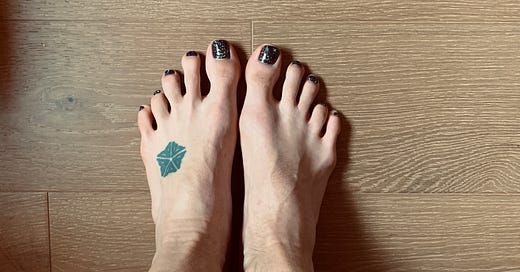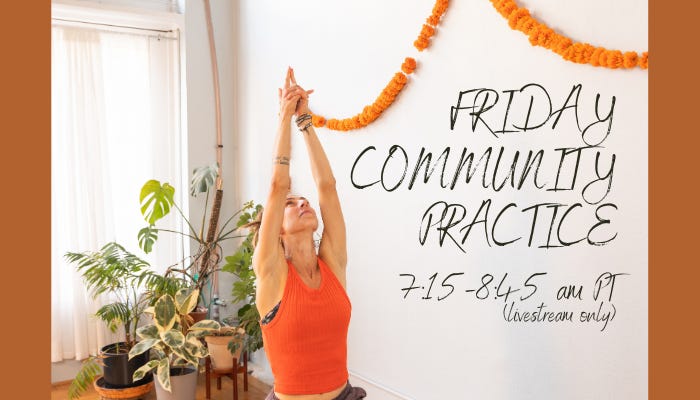I remember the first time I got a pedicure, I was embarrassed. I could hear my father’s voice, loud in my head: “What a waste of money, paying someone to do something totally unnecessary, something you could do yourself.”
Maybe it is “unnecessary,” even “frivolous” - I’ll give him that. But so is dessert, and he ate that all the time.
Plus, I actually can’t paint my toenails myself.
I remember hearing a woman say that she got a massage every week, to help with her fibromyalgia. And before I could say anything, she followed it up with, “And some people say to me, ‘Wow, that’s so luxurious!’ To which I say, ‘Yeah, having constant muscle pain and stiffness that requires weekly massages - so luxurious!’”
Touché.
It’s funny, sometimes, what we choose to label as “necessary” and what we see as “luxury.”
There was another habit my father had:
Whenever I would say I “needed” something, he would reply, “Need? Neeeeed? Will you die without it??” It was sort of a joke, but also, sort of not.
Looking back, I understand that he did not want me growing up entitled, demanding things that I really didn’t need; but in the moment, and for decades afterward, all it did was make me think I shouldn’t need anything.
Needs were reserved for water and food and maybe sometimes love. But only if we were really, really struggling. It’s so funny, because my dad was actually a very affectionate person. He loved people, he loved me, he loved my mom and my sister. That was clear. But when it came to “needs,” he had a hard line: If death was not imminent without it, you did not need it. It was, instead, a “want.” And a “want” was greedy.
Since my father died, I have been trying to figure out the difference between my needs and my wants. In high school, I played three sports, was in all the plays, studied hard, and rarely rested, because I could. In college, I slept as little as possible, ate as little as possible, and did as many extracurriculars as possible, because technically I could survive. When I started grad school, and then became a school teacher, I worked like a mad woman, slept almost none, and numbed myself whenever I could because again, I was alive, wasn’t I? I even spent four years in an emotionally abusive relationship because I would tell myself, “He doesn’t physically harm you, Abby; you’re alive, you don’t have any bruises, you’re fine.”
There would be times when a voice would shout, “Hey! This is really hard, and it could be easier if you asked for support!” But each time, I would tamp it down, like a barista preparing espresso.
In my first therapy session with IFS, my counselor asked me, “What would happen if you imagined reaching into your body and pulling out that espresso tamper?”
I didn’t even have to imagine doing it; imagining the imagining made me start to cry instantly. I was so afraid of expressing need, so afraid of confusing desire with gluttony, so afraid of being labeled as needy, entitled, selfish, that I just kept pressing everything down.
I was afraid that if I admitted to needing or wanting things, the people around me would leave. “Too clingy,” they’d say. “And what a selfish bitch.”
And to be fair, it wasn’t just my father who instilled the fear that I would grow up entitled. It was also my observation of myself, and my place in the world:
I am white. I grew up wealthy. I went to good schools. I have a masters degree. I am thin. I am conventionally attractive. I am quick-witted and funny, and can even be charming. I am athletic and strong and tall and can defend myself physically, as well as verbally.
But these things are privileges, not entitlement.
It is entitlement if I exploit these privileges at the expense of others.
It is entitlement if I ignore these privileges, or pretend that they have nothing to do with who I am, or the space I occupy.
And, they are not the only things about me:
I also have a fused spine making me, technically, disabled. I lost my father at the tender age of 16. I grew up watching my grandmother die of Alzheimer’s. I went through years of scoliosis treatment in which I was told there is no cure, so the best we can do is everything, all at once, until you go crazy because you will be trying so hard to fix your spine when in reality there is no way of fixing it, but you should still keep trying even though everything in your body is screaming and crying for the doctors to just leave you alone and let you be a fucking kid!!
I am not simply a collection of fortunate or unfortunate circumstances, I remind myself.
And only I know what I need, what I want, and what I cannot live without.
Or at least, I am learning.
And one of the things I’m learning is that I need someone to hold my feet. I need someone to massage my soles, to trim my toenails, and to paint my toenails with color and sparkle.
There is nowhere that I am more aware of my privileges than in this nail salon.
I look down the row and see three white women, sitting in massage chairs. Sitting by their feet are the Vietnamese women who run the shop, scrubbing and massaging and holding the white women’s feet. Two of the white women are talking to each other; the third, like me, is quiet, eyes closed. The woman holding my feet is giving me an amazing massage, and I am so grateful that she can reach my feet for me. I have seen her before, and she is my favorite, and I think she knows it. She speaks very little English, but we have shared enough words for me to know her name, and that she has lived here sixteen years, which is six years longer than me. She does not know about my fused spine, or that it has been nearly twenty years since I’ve been able to paint my own toenails. She does not know about my dead father, or my fear of expressing needs, or the tamper that lives inside my body. And still, she holds my feet with care. I want to tell her that I would do the same for her, and that I am aware of how I must look: another white lady coming in to get her toes done… But that would be the guilt talking, trying to “make up” for my privilege. In a weird and insidious way, it would be the entitlement that I have tried so hard to avoid. So I decide instead to close my eyes, to concentrate on the kind touch I am receiving, and trust that, in this moment, the best thing I can do is feel.
Thank you for being here. To read more about this project, or to join me in this creative journey, you can read this post, or simply follow the prompt below:
Choose one part of your body, then write or create something inspired by that part. It can be a poem, an essay, a song - even a painting or a dance! Whatever the creation, let it be an inquiry into your own body, and all the bodies you have been influenced by: parents, ancestors, friends, enemies, doctors, teachers, therapists, pets…
Our next prompt is: SHOULDERS.








Abby, love, love, love this piece. Thanks for sharing.